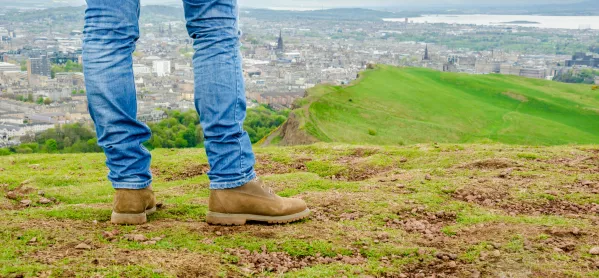As we come to the end of Mental Health Awareness Week, it feels different to previous years. It’s the first one that teachers will have spent without being in the midst of exams, without meeting new classes (in person, anyway), and without that final parents’ night of the year.
They can all be anxiety-inducing in their own ways, of course - but now our mental health is coming under pressure of another kind altogether.
Here are some things I’m doing to help myself and my mental health in the midst of the coronavirus pandemic:
1. Ignore the haters
Firstly, I’m ignoring all teacher shaming or teacher bashing online or in the newspapers. I know how hard we are working as a profession, how quickly we turned our way of working upside down.
On the first day of lockdown, teachers were posting work for their pupils and this has only become better as the weeks have gone on. One friend who teaches in a primary school spent hours creating an amazing amount of Star Wars videos, work, resources and homework for Star Wars Day on 4 May - way more than she needed to but, like all of us, she went well beyond the extra mile.
The volunteer list in my school to go in and work with and supervise the children of key workers is always oversubscribed, and I know this will be the same all over the UK. We should feel proud of our collective efforts. So do yourself a favour and don’t bother with cheap headlines or throwaway tweets - you’ll feel better for it.
Ignore the naysayers: ’Teachers know what’s best for their pupils in this crisis’
Lockdown: ‘The 5 things I miss most about being in school’
Mental health: ‘Nothing beats kindness in a crisis such as this’
Struggling to cope? ‘Don’t worry - you’re doing fine’
2. Stay connected
I think it’s really important to stay in touch with your friends and family. If that’s Zoom or just a text, make sure to reach out. I also think it’s important to keep in touch with some colleagues. It’s always helpful to bounce ideas around or even just hear that others are finding the work, childcare and lockdown balance really tricky, too. Getting in touch gives you a chance to speak about your experiences, and that’s so important for mental health during lockdown.
3. You time
Time to yourself is essential for your mental health. Remember, if you have children then you’re in with them an awful lot more at the moment than usual, and any “me time” you normally have might has disappeared. My wife and I are giving each other a half-hour throughout the day to break away from work, the children and the house, to just go for an adult walk and blow off the cobwebs. I always return ready to get stuck back into work or crafting or to make the lunches for the boys - whatever is needed. Whatever works for you, whether it’s having a bath or playing darts in the shed, make sure to make time for it.
4. You’re not a robot
The biggest boost to my mental health during lockdown has been reminding myself that I’m not a robot, that I can’t do everything. Sometimes I have to prioritise school, and sometimes I prioritise home life, depending on my wife’s work commitments that day. Just telling myself that I’m doing the best I can in a really bizarre situation is enough, and I feel instantly better about it. So please, if you’re feeling like you can’t do anything brilliantly at the moment then realise that’s OK - you’re not a robot, either.
As this most unusual Mental Health Awareness Week draws to a close, we need our teachers to be the leaders in looking after themselves - and if you do that, you’re also looking after your pupils the best you can.
Adam Black is a teacher in Scotland who, in the 2019 New Year’s Honours list, received the British Empire Medal for raising awareness of stammering. He tweets @adam_black23




